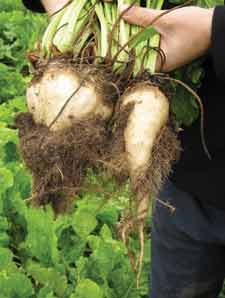Breeders making strides in beet resistance

Breeders have warned growers to test their soils to find out the extent of beet cyst nematode (BCN) populations before deciding to grow tolerant varieties.
This year’s BBRO Recommended List, which costs the BBRO and the British Society of Plant Breeders £440,000 annually, includes two more varieties that have BCN tolerance – Pitbull and Thor.
The varieties provide a significant yield drag in the absence of BCN, therefore, if the pest populations are isolated or insignificant, it will be uneconomical to grow them.
“Varieties such as Pitbull are very good tools in stabilising or even decreasing BCN levels,” said Ian Munnery, general manager at SESVanderHave.
“It will give around 92% of the mean yield on the Recommended List, so you need to monitor the problem and make an informed decision based on the evidence.”
Mr Munnery believes that if BCN populations are above 15%, then a tolerant variety such as Pitbull should be considered. “Anything less than that, growers should plant a lighter tolerant variety with less yield drag or go all out for yield,” he said.
Thor, the second addition to the line up of BCN tolerant varieties, is being sold by UK distributor Elsoms. Adrian Hayler, sugar beet manager at the company, highlighted that there is a much lower premium on seed costs this year.
“In the past, the cost of BCN-tolerant varieties has been considerably higher, but for 2013 they will be more comparable with other options,” said Mr Hayler.
Rhizomania
Progress is also being made in the battle against a constantly evolving rhizomania problem, with KWS introducing the AYPR resistant variety Isabella last year.
The AYPR strain, a mutation of the virus, has broken the resistance of the Rz1 gene that has been so effective at protecting sugar beet yields. “The AYPR strain is spreading though so we need to remain one step ahead,” said Simon Witheford, sugar beet product manager at KWS.
“Double resistant varieties such as Isabella, which include the Rz2 gene, have a greater yield advantage in the presence of the AYPR strain, which was proven in BBRO trials.”
Up for approval next year is KWS’s Sandra, which the firm believes is a further progression in yield for double rhizomania resistance varieties.
“In five to 10 years’ time, I expect all recommended varieties to include the Rz2 gene, which will result in less virus content in soils and reduce the spread and propagation of rhizomania,” added Mr Witheford.
Going to Cereals 2012? See our Cereals 2012 events page for more details.

